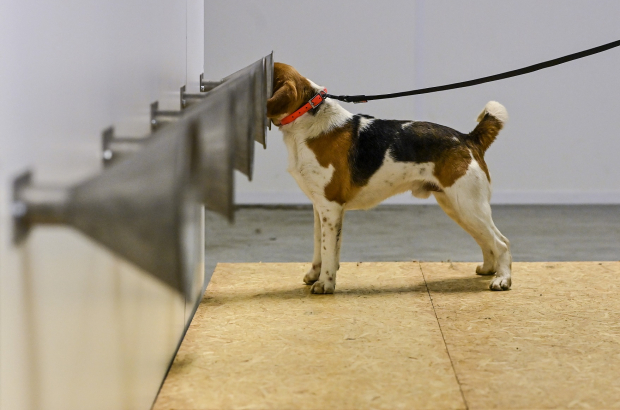- Daily & Weekly newsletters
- Buy & download The Bulletin
- Comment on our articles
Dogs trained to detect presence of Covid-19 in human sweat
While vaccinations in Belgium against Covid-19 could begin as early as this month, it’s expected that we won’t all be vaccinated for many months to come. Most of us would welcome a return to normalcy in 2021, which is where sniffer dogs come in.
The universities of Ghent and Liège are working with the federal police and military to train sniffer dogs to detect the coronavirus in people. This would allow people to be filtered out of large events like festivals and football matches, thereby stopping what could end up being a large number of infections. They could also be put to use much sooner in spaces where international travellers pass through, for instance, such as airports and train stations.
The universities announced the project a few months ago, and different breeds of dogs are now being tested to see if they are fit to go through the training programme. Finland is already using dogs at the Helsinki-Vantaa airport, which is saving a huge amount of time and money compared to airport testing facilities.
In Helsinki, samples are taken from passengers and presented to the dogs behind a screen, so the dogs never come into contact with them. Passengers are then advised if they need to report to health services for a test.
The presence of the Covid-19 virus can be detected in sweat, but this is undetectable to humans. Dogs, on the other hand, can detect the most miniscule of differences in smells. The dogs are being trained using samples of sweat from people who do not have the virus and from people who do.
“There are only a few components that distinguish between a positive and a negative sample,” UGent professor Kris Callewaert told VRT. “The intention is to train the dogs in such a way that they can easily recognise the difference.”
Once trained the dogs could detect the presence of the virus even if the infected person is not sick. The first set of dogs should be ready to detect the virus by February.
Photo ©Dirk Waem/BELGA



















Comments
Ik heb altijd gezegd, in de geneeskunde lopen ze 50 jaar ten achter. Sorry, ik heb mij vergist, ze lopen 100 jaar ten achter!!! In 1918 was er een gelijkaardige epidemie, 1 van de redenen waarom ze WO I stopten! Hopelijk leren ze nu ipv bla,bla te verkopen en er schandalig hoge lonen voor te krijgen. Mijn innige deelneming aan alle getroffen families en vrienden!